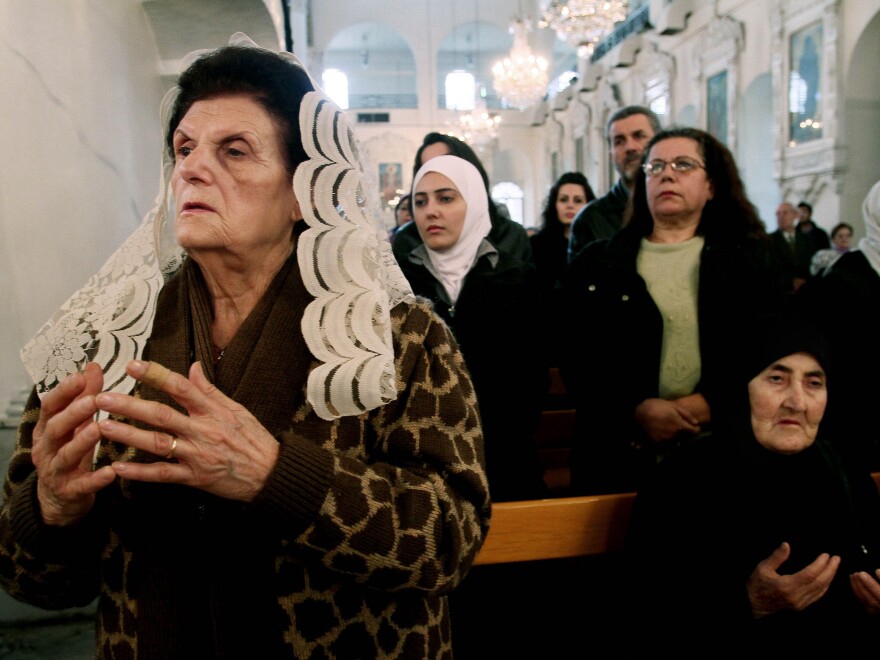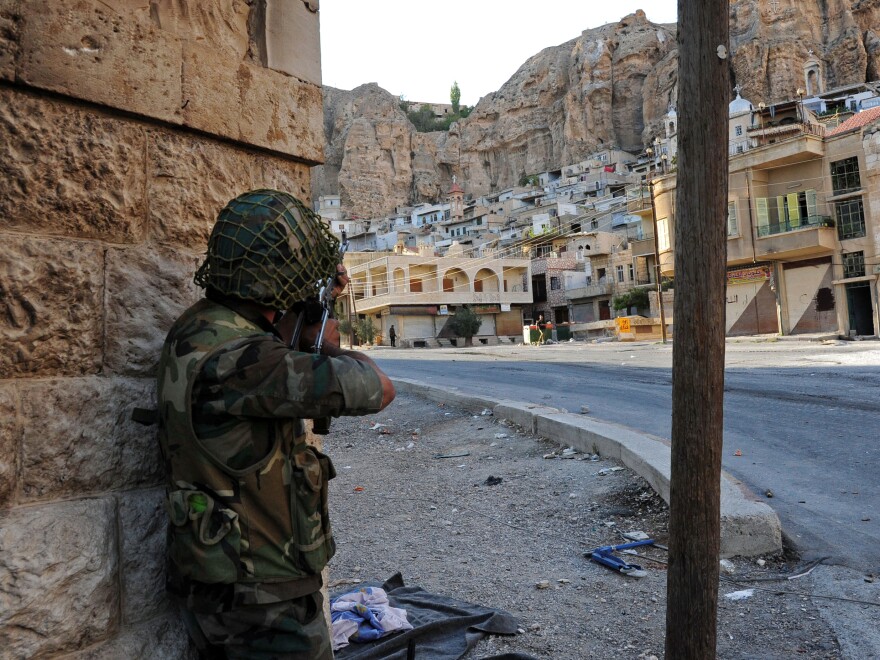There are differing versions of what happened to the Greek Orthodox nuns of Maaloula, who left their convent north of Damascus earlier this month. Some say the nuns are being held hostage by Islamic radicals. Others say they were under missile assault by the forces of Syrian President Bashar Assad and were rescued by rebel fighters.
NPR now has a firsthand account from one man who was in Maaloula — and says he helped with the nuns' passage.
When Abu Majid, a 25-year-old Syrian rebel, negotiated the nuns' passage from the Mar Tekla convent in the ancient, Aramaic-speaking town of Maaloula, he was convinced they would be killed if they stayed.
"He decided to kill you and blame us," he recalls pleading with the sisters, referring to Syrian President Bashar Assad, after a surface-to-surface missile shattered the convent's thick wooden door on Dec. 3.
His talks with the nuns over their safety began earlier in the day as five rebel groups — local insurgents, including an al-Qaida-linked battalion — fought Syrian government forces for control of the predominantly Christian town. The battle in Maaloula was part of a larger war for the strategic area of Qalamoun, near the Lebanese border. The nuns, the only civilians left in town, were reluctant to leave the convent, built deep into the rocky landscape.
But after a missile hit at dusk, Abu Majid says, "it was crazy," and the nuns agreed to go. "At first, they had to walk. It was too dangerous to bring cars into the town."

Abu Majid says he told the frightened sisters that if the Syrian soldiers saw car lights, the army would kill them all. From the outskirts of Maaloula, a convoy of rebel cars moved in darkness and transported the women, including two Lebanese and one Iraqi nun, to an isolated villa in a rebel-held village, away from the immediate danger.
"To make them feel safe, a local rebel came with them from Maaloula. He was in the lead car," Abu Majid says.
The events surrounding the nuns' departure from the Mar Tekla convent has become a tale of competing narratives. Syrian government officials immediately accused radical Islamist rebels linked to al-Qaida of kidnapping the sisters at gunpoint. Syria's government-controlled media contends that Muslim extremists are targeting Syria's minorities, including Christians.
But Abu Majid says local rebels were protecting the women from the regime shelling on an ancient Christian town.
"Assad always says he protects the minorities, but he shells them," says Abu Majid during an interview in Lebanon. The thin-faced young man, with dark hollowed eyes, agreed to talk about the nuns of Mar Tekla and his role in their departure from Maaloula on a rare visit across the border in a short break from the battlefield.
Refusing an offer of food in honor of his fellow fighters, Abu Majid says rations are so short that his battalion has learned to survive on local dates and cigarettes. He finally drank some sweet tea.
Church Confirmation
A law student before he joined Syria's rebellion, Abu Majid now leads Ahrar al Asserian, or Free Asserians, a local Muslim rebel group. In addition to Arabic, he speaks Aramaic, a language shared with the sisters of Mar Tekla. He says the nuns left the convent willingly and were permitted a satellite call to confirm their safety.
Some of the details of Abu Majid's account were confirmed in a call to the office of the Apostolic Nuncio to Syria, Archbishop Mario Zenari in Damascus.
"The sisters have been in touch with the local bishop," Zenari says, referring to the head of the Damascus-based Greek Orthodox Church. He adds that the sisters were also allowed to make a call to the office of Lakhdar Brahimi, the U.N.'s special envoy to Syria.
Zenari did not call the nuns' departure from Maaloula a kidnapping. "As far as we know," he says, "the sisters were taken to a safer place," though he adds that the situation is "still confusing."

The calls made by satellite phone, he says, were made at about the same time that a video surfaced, on Dec. 6, of the sisters sitting on a sofa in front of a heater explaining that they had been taken away for their own safety.
The head of the convent, Mother Superior Pelagia Sayyaf, spoke directly to the camera. Her account tallied with Abu Majid's version of a fast drive out of Maaloula under heavy shelling.
"We can't say anything, except may God give them all health," Sayyaf said in the video, referring to the rebels who are not seen on screen. "I thank those who offered this favor, food, water and welfare."
Abu Majid says government forces have cut off all food deliveries into much of the Qalamoun area, but there are still stored supplies. The nuns are getting the best food, he says.
"They even get chicken when we are eating dates and water."
Conflicting Reports On Talks, Demands
The complicated negotiations to release the nuns now include the Syrian government, the Vatican, Qatar, the rebels and a wealthy Syrian Christian businessman who runs an oil and gas construction business with ties to Moscow, according to Abu Majid. The talks are taking place against a backdrop of fierce battles between rebel groups and the regime in the Qalamoun region where the nuns are believed to be held.
Abu Majid says the regime started negotiations "immediately." He says the contact was through George Haswani, a Christian businessman with close ties to the Assad regime. Haswani sent his representatives to talk to the local rebels in person, Abu Majid says.
He also says officials from Qatar have reached out to the Nusra Front, the al-Qaida-linked group that is part of the rebel alliance in the area.
The al-Qaida connection has muddied the negotiations. There are conflicting reports that rebel groups have made demands for the nuns' release since their escape from Maaloula. Some reports in the Arabic media cite an ultimatum from the Nusra Front demanding the release of a thousand female prisoners in exchange for the nuns. Abu Majid says those demands did not come from his group, which is guarding the nuns.
Calls for the safe release of the Greek Orthodox sisters are pouring in from around the world. Pope Francis has urged people to pray for the sisters. The fate of the nuns also plays on the fears of Syria's minority Christian community, who believe Muslim radicals are targeting them.
"We do have demands," Abu Majid adds, but he says those demands came later, when the sisters were safe and the negotiations had begun.
He says he wants the Syrian government to end the long siege on the Damascus suburb known as Ghouta. According to international aid workers, Syrian regime forces have blocked all food and medical supplies there in a deliberate campaign of starvation that punishes civilians as well as rebels.
But Abu Majid says there has been no response from the Syrian government to his group's demand to lift the blockade. He says his rebel group will continue to protect the nuns, despite the battles in Qalamoun.
"The nuns are inside the villa. The rebels are outside," he says.
Abu Majid says he has met with Sayyaf, the mother superior, twice since her group arrived in early December. He spoke with her about Assad, the Syrian president.
"She told us, 'Bashar is not saving us, God is saving us," he says.
In the complex war in Syria, the nuns seem certain that only God will prevail.
Copyright 2021 NPR. To see more, visit https://www.npr.org.



